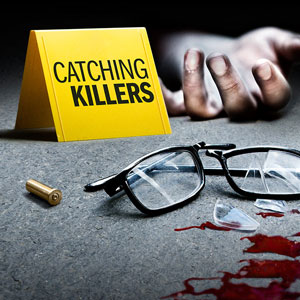Episodes
Published 06/23/12
Identifying all of the skeletons found under Gacy's house will take years, but by reading the clues in the bones, forensic anthropologists can tell what kind of person the Killer Clown targeted.
Published 06/23/12
With only tiny insect fragments from the radiator in Vincent Brothers' car, bug experts can prove his alibi is a lie.
Published 06/22/12
In 1983, police in Leicestershire, England struggle to make their case - until they join forces with scientists, who are just discovering the potential of DNA profiling.
Published 06/22/12
Join executive producer Annie Paterno and director Jay Dahl on the set of Catching Killers to see how recreating an investigation is all about the details - right down to the clunky computers and office supplies.
Published 06/22/12
From cradle to grave, no matter how much fingers grow, everyone's fingerprints are unique and unchanging.
Published 06/22/12
In 1935, when decomposing body parts were found under a bridge, maggots were used to determine time-of-death and bugs became evidence for the first time.
Published 06/22/12
In the first case using ballistic evidence, the validity of ballistics as a forensic science was called into question when an "expert witness" lied on the stand and sent an innocent man to death row.
Published 06/22/12
After multiple shootings, the only evidence in the DC Sniper case are bullet fragments pulled from the victims. Luckily, scientists can use those to answer vital questions about the killer's weapon.
Published 06/15/12
Forensic investigation is nothing new to Smithsonian's National Museum of Natural History. Their collection of donated human skeletons has been used to solve crimes.
Published 06/15/12
In 1840, a murder case hinges on whether a man died of cholera or arsenic-poisoning, and for the first time ever, scientists are called in to test his remains.
Published 06/15/12
Playing a corpse isn't easy, but Hannah Sarrouy, who played a dead girl in Catching Killers, is now a master of the "dead face."
Published 05/23/12
When BTK started killing, using DNA evidence wasn't the norm. But 20 years later, tiny traces of DNA left on his first victims could be enough to bring him to justice.
Published 05/23/12
The Night Stalker investigation was blown wide open when - for the first time ever - a laser was used to illuminate latent fingerprints.
Published 05/23/12
With Michael Swango in custody for fraud, it's up to the scientists to figure out how he killed his patients - before his sentence is up and he gets another chance to escape.
Published 05/23/12


